Culture
Ban On Isese Festival In Ilorin Unconstitutional: Kwara Police Command Very Wrong
Published
3 years agoon
Ban On Isese Festival In Ilorin Unconstitutional: Kwara Police Command Very Wrong
By Adeola Soetan
Okasanmi Ajayi is the Kwara State PPRO who signed the unconstitutional press release against freedom of worship by Isese adherents on behalf of the Kwara police command headed by a police commissioner, Mrs Ebunoluwarotimi Adelesi.
Ajayi in Yoruba culture and tradition means a child born with their face downward. The foreign Islamic and Christian faiths originated in Saudi Arabia and in Judea in the present Middle East, can’t and won’t name such a child Ajayi since it’s not part of their religions and cultural history. They may have equivalent names which I don’t know. But what I do know is that only Isese people i.e. all Yoruba by tradition do name children with such birth circumstances of facing down during birth, Ajayi.
The very good and unique Yoruba traditional name comes with Yoruba “Oriki” cognomen and praises derived from Ifa names and naming morphology and mythology. And the Oriki is the unique way of baiting and petting Ajayi when he’s crying or annoyed as a child or adult, or it’s used to praise Ajayi when he does something spectacular.
In Yoruba land, there’s no person except “foreign Yoruba” that doesn’t have Oriki (cognomen) and Oriki is always traceable to the child’s genealogy, the original deity of the child’s ancestors, their prowess in human endeavours like in war, hunting, trade, commerce, and industry, family’s taboos, dos and don’ts. Your Oriki at a glance can tell at once what is your family root, where from and who you are. It’s a summary of one’s cultural identity. When you hear Oriki like Ikoyi Eso, or “Agbogunleri pantete” (the one who is at ease with war), you know the person is from a warrior family.
Ajayi’s Oriki goes thus: “Ajayi Ogidi Olu o ni kanga ajipon. O fomi osuru weda. Eni Ajayi gba gba gba ti o le gba tan, Gunnungun ni gba Oluware…” In simple English translation, it won’t capture the total essence of the idiomatic expression since the English language suffers idiom closure. It means “Ajayi who owns a mythical well that people fetch water from before daybreak. The one with an abundance of mysterious water to bathe. He whom Ajayi cannot save from predicament only the vulture (sacrifice) can save the person”
With this Ajayi by that name, the Kwara PPRO is an Isese person by birth traditionally. Whether he’s a Christian or Muslim today, he can’t run away from that cultural identity.
Okasanmi is Ajayi’s surname. Like Ajayi, Okasanmi is also not a Muslim or Christian name. It is a deep-rooted Yoruba name which means “Oka” blesses me, or I am pleased with “Oka”. If the PPRO is from Oka-Akoko and that’s the origin of his surname, or first name, then his roots must have something to do with the deity or deities of the Akoko soil that prospered his great great-grandfathers in whatever form. That name is in appreciation of the soil and hills of Oka Akoko.
However, if the name “Okasanmi” is a subcultural modification of “Okesanmi” (I’m blessed by the hill and its deity), then his roots have to do with the hills, mountains and the relevant deities. In Abeokuta for instance, we have names like Okedara, Okerayi, Okegbemi, etc. All the names are in appreciation of one deity or the other that has to do with hills and mountains from the family geology. It’s difficult to find a person not from a hilly or mountainous place bearing the “Okedara, Okerayi, Okebadan…
In Ibadan there is the popular Odun Okebadan, ie Okebadan festival whose Chief Priest is called Aboke, meaning the priest that gives sacrifice to the hill. His shrine is located at Bere, a rustic hilly area of brown roofs mostly inhabited by the poor and struggling natives. All their elite children have run away to GRAs, Ring Road, Ikoloba, and other “developed” places because of their self-imposed fear of family witches and wizards their pastors and Imams always scare them with, making Bere, Oja Oba, Orita Merin, Born Foto, Idi Arere and other adjacent places of their growth remains underdeveloped. It was when I interviewed Aboke years back for a cultural documentary that I knew hair plaiting is not an exclusive preserve of Sango Olukoso deity and his chief priests. Knowledge is truly infinite.
In conclusion, when I saw the public statement issued by Mr. Okasanmi Ajayi, Kwara PPRO telling the Isese adherents to go and do their Isese somewhere else. (But he didn’t tell them the “somewhere else” they should go and have their festival, in a secular state & country with no state religion by law?). It’s like a PPRO named Mohammed telling Muslims that they can’t have Ileya festival in Ilorin, Kwara. Or a policeman named Emmanuel warning Christians not to celebrate Christmas in Ilorin. We either have a country that’s ruled by law or not, our pretence of “one nation” and equality of citizens must stop.
By his name and family cultural/religious lineage, Okasanmi Ajayi is an Isese man and to Isese he belongs by root even though he’s doing his job but wrongly as a law enforcement agent. He can’t and should not despise his root. For the command to tell Isese people to go elsewhere is a contempt of their rights and a breach of their freedom of worship.
Instead of committing lawlessness by intimidating Isese people for some extremist Alfa most of whom are also products and covert or overt practitioners of Isese, he should have advised his bosses as a PR person, that police security should be provided for the Isese Festival which Ilorin has a unique honour of hosting its national convergence for the first time. Like Osun festival in Osogbo, Lisabi festival in Abeokuta, Agemo festival in Ijebu, Ogun Onire festival in Ire and Ondo towns,Ilorin. Isese Festival is a good global cultural mileage for Ilorin, a town that has many short-time hotels almost equal to Lagos. That I can testify and anyone in the social circuit or a tourist can verify my claim.
Police should have arrested those lawless arrogant Alfas who took the law into their hands by preventing Isese people who as citizens have fundamental rights and freedom of worship anywhere in Nigeria in accordance with the Supreme Constitution of Nigeria. Section 38 (1) states that:
“Every person shall be entitled to freedom of thought, conscience and religion, including the freedom to change his religion or belief, and freedom (either alone or in community with others, and in public or in private) to manifest and propagate his religion or belief in worship, teaching, practice and observance.”
The Constitution is supreme and its provisions shall have binding force on the authorities and persons throughout the Federal Republic of Nigeria… Until Ilorin and the entire Kwara state are constitutionally proclaimed as a separate Islamic Republic of Ilorin or Kwara from Nigeria, the Supreme Federal Nigerian constitution is binding on all citizens and people of Ilorin no matter the status. . It’s about global and national constructional rights of citizens to be upheld by law enforcement agencies, human right activists and organizations and by all conscientious people.
Since we have over 4000 recognized religions in the world and each claiming God, I think the supremacy battle and which religion is of God or not, good or bad, should be reserved for judgement day, not in a secular Nigeria governed by law.
If we bend the law today for certain interests, it’s an invitation to chaos tomorrow. Let all religious extremists including those Alfas that have been openly threatening to fight, maim or kill any Isese adherents who dare to come to Ilorin wait for the judgement day of God/Allah. Or the “judgement day” is just a mere cruise? If not, then why the hurry, hurry? Let Peace Be.
ADEOLA SOETAN IS A MEDIA PRACTITIONER AND CULTURE PRESERVATION ACTIVIST
You may like
-
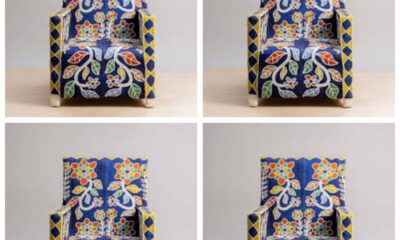

Ijesa-Isu Ekiti Not Engrossed In Any Crisis Over Monarch’s Selection – IIEDC President, Ibikunle Aderemi
-
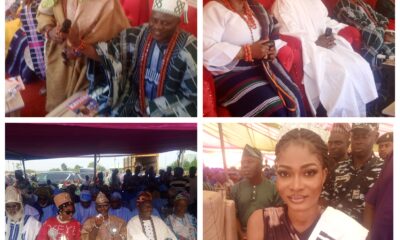

Onisan Hails Governor Oyebanji For Approving Isan – Ipere Road Construction
-
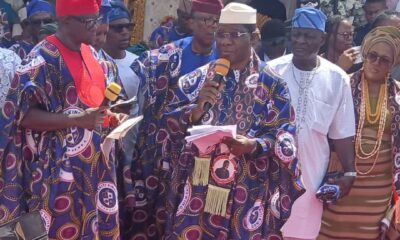

Iyin Day 2025: MOB Gets Olu Omo Of Iyin Ekiti Kingdom Title
-
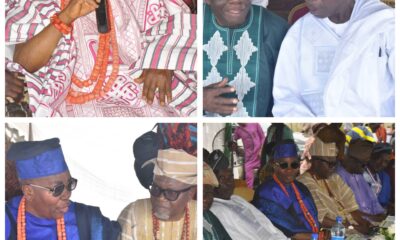

Efon Stakeholders Seeks More Government Contributions For Community
-
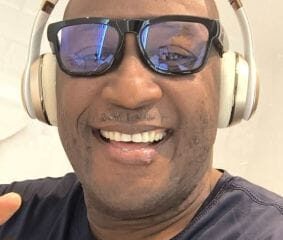

Disregard Politically Motivated Fraud Allegations Against Our Ex-Governor – TAMPAN Caucus
-


Udiroko Festival: Professor Oyarekua Extends Felicitations to Ewi, Ado Progressives
